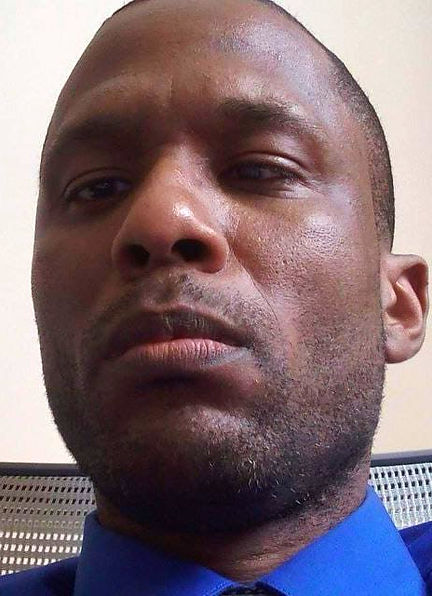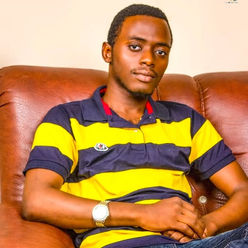Click Text To Enter The Annual Bridgette James Poetry Competition Online From April 1, 2026, Judged By Chinua Ezenwa-Ohaeto.

1. Editorial by Chukwuebuka Freedom Onyishi
2. The Metaphor of How We Render the Anthem of Broken Clouds by Abubakar Auwal
2b. Theoretical Constitution of Broken Metaphors by Abubakar Auwal
3. Happiness is Selfish by Gargi Sidana
4. Scars and Stars by Msendoo Rachel Tarter
5. The Pariah’s Resume by Owen Lwanda
6. What Anger Learns When it Stays by Abraham Aondoana
7. Go Home by Uche by Chidozie Okorie
8. The Janitor of the ICC by Majekodunmi O. Ebhohon
9. The tongue we never lost at sea by Uchechukwu Onyedikam
10. Age of Content by Osahon Oka
11. If you come to my country Mambas will swallow you by Obaji Godwin
12. A Review of Michael Emerald Oladosu's chapbook: Every Little Thing That Moves
13, Short Fiction by Lergon Parris
Latest Edition of Journal

Please Click Link to Read Osahon Oka's Essay: 'Age of Content.' When Kierkegaard wrote the above, the world as it is at present did not yet exist. The industrial revolution had begun not too long ago; however, paper and ink were still the vehicles by which intellectuals and their ilk disseminated and acquired knowledge. Gutenberg's printing press had opened the doors to mass printing of written matter, thereby giving writers in Kierkegaard’s time access to a larger reading audience. This access to more readership exploded with the introduction of the world wide web to the public in the 90s. Today the dissemination of information and knowledge to a far larger audience is possible for anyone who has an internet-enabled gadget, whether a cell phone or personal computer. With this surge in the availability of knowledge, there has been an equal surge in the need for entertaining content. In this new age, the term ‘information overload’ is a common expression. Anyone with an android phone can become an authority on anything and everything.
.png)
Get featured on Bridgette’s Writing School Facebook page. Please send an email, subject header: Paid Feature to pennedinrage@outlook.com Please DO NOT Pay until you’ve received a confirmation that your book will be advertised on social media. Packages – A 2-day package: (two) days advertisement - £5.00 (Pounds Stirling) A 5-day package (five) days advertisement - £20.00 (Pounds Stirling).
Submit a Poetry Manuscript to be Edited or Reviewed - £10.00 (up to 20 poems); £20.00 (up to 40 poems). Email: pennedinrage@outlook.com
Soil Unfurling from Stem is a multi-author collection of nature poems from sub-Saharan Africa. Contributors include Dr Kayode Adesimi Robbin-Coker an English Language and Literature graduate of the Universities of Oxford and Cambridge, Dr Jive Lubbungu from Zambia, Chukwuebuka Freedom Onyishi, the current Winner of the 2025 Coalition of African Literature, a Nonprofit organisation in Nigeria and fifteen-year-old Namibian secondary school student, Utaara Tjozongoro.

The anthology, Soil Unfurling from Stem, 2025, features two Nigerian brothers: Emerald & Daniel. Please click gallery to read more.
Ladies and gentlemen, please read advance notice regarding sending out hardcopies of books to AFRICA.
From May 2026 onwards, I will no longer post out copies of books to shortlisted contestants (with the exception of those in the United Kingdom) due to the postage and transportation costs involved, when sending parcels to your beautiful African countries.
If I can find a British press to merge with then perhaps that service will continue. It was foolish of me to think I could do it on my limited budget.
Along the way, I got defrauded by a Zambian publisher whom I paid via Western Union in June 2025, but Mr Kayika has since stopped communicating with me and didn’t publish the original thirty copies of Soil Unfurling from Stem. I've notified the authorities in Zambia.
After the 2026 poetry competition, a winners’ anthology will be published on Amazon. If you have friends and relatives abroad, you’re free to ask them to assist in sending out copies. You’d agree that's what other outlets do. All published writers receive a PDF copy of book anyway.
Thanks for your custom.

Head Judge: Chinua Ezenwa-Ohaeto Will Read the Best Competition Entries. OPENS April 1st, 2026
NEWS
The Annual Bridgette James Poetry Competition Returns on Wednesday April 1st 2026. Closes midnight BST on Thursday 30th APRIL 2026.
CLOSED
Click to Subscribe First
Enter From April 1st to April 30th:
1. Either Online: Click Me (Scroll Down)
2. Or By Email
Kindly Do Not Enter More Than Once.
Links to Names of Judges are Displayed Below:
1. Mr Chinua Ezenwa-Ohaeto -
Https://ellaspoems.com/thebridgettejamescompetition#head-judge-chinua-ezenwa-ohaeto
Https://ellaspoems.com/thebridgettejamescompetition#judge-osahon-oka
Https://ellaspoems.com/thebridgettejamescompetition#judge-jive-lubbungu
4. Mr Gary W. Bryant
https://ellaspoems.com/thebridgettejamescompetition#gary-w-bryant
Please Be Aware You Need to Subscribe to the Website, in order to Participate. Thank You. You Will Receive Emails from: pennedinrage@outlook.com
Please familiarise yourself with the competition rules.
Simultaneous submissions NOT ALLOWED.
When the competition OPENS, please submit ONE poem ONLY on the topic: OUTSIDER. Only one poem can be submitted. However, I advise that you concentrate on drafting and redrafting your poem before submitting it. In the past grammatical errors have cost entrants a win.
"Don’t be too hung up on form. The content is far more important than how much the poem rhymes. Or how many literary devices you’ve used. Please do not waste your data sending in meters:"
Nigeria is a country of rivers. (a)
Outside, the harmattan wind gave me shivers. (a)
But I have hope, (b) that’s how I cope (b)
COPYRIGHTED (Name withheld)
"The above – a stanza from a formal poem submitted in 2025 - isn’t what I’m seeking. There’re numerous good poems in Penned in Rage Journal."
RULES:
• Submitters MUST send in an original piece of work. (I do run checks for plagiarism and AI-generated content on all selected poems. Contestants have previously been disqualified for submitting an already published or AI-generated piece.
All poems must be in English. You are reminded to proofread for spelling and grammar.
Orthographically challenged work will not be processed by the Admin or Reading Panel.
• All submissions must be in a Word.doc format please.
• You MUST enter under your real name. If using a pseudonym you MUST disclose your real identity to competition organisers.
• The competition is free to enter.
• Poems should be on the theme OUTSIDER, written in the first-person narrative.
• Poems must not exceed forty lines.
• Your work is accepted on the basis that this will be its first publication in Penned in Rage, Literary Journal, on my Social Media pages or this website.
• Poems cannot have been broadcast on any regional, national or online TV station or via any radio platform.
• Poems cannot have won any other competition.
• Poems must be written in English, but you can include phrases in your mother tongue or another language.
• You MUST NOT enter a poem written by more than one author
• Entries will be accepted from sub-Saharan Africa or its diaspora and Afro Caribbean islands ONLY. You MUST indicate country you are submitting from.
• Rejected competition entries are deleted. Please ensure you keep a record of all poems entered and send copies only.
• Entries will NOT be accepted any other way, except via email address or online. All emailed or online entries must be received by midnight BST on Thursday 30th APRIL 2026. Late online entries will not be accepted under any circumstances.
• The head judge's decisions are final, and no correspondence will be entered into concerning his decisions.
• Due to the large number of entrants, I am unable to respond individually to submissions.
Rules: winners
-
By entering this competition, entrants agree that their poems and data may be used by Ella’s Poems, including for educational purposes as material for Bridgette’s Writing School, Facebook.
-
Due to the high number of submissions, only successful entrants will be notified. Details of the full winners list will be announced publicly on www.ellaspoems.com on May 30th 2026.
-
The winners will be paid via Western Union ONLY.
-
Photographs of winners will be displayed on www.ellaspeoms.com.
-
The copyright of each poem remains with the author. However, by entering the competition, authors of the winning poems grant Ella’s Poems the right to publish and/or broadcast their poem, and to do this before anyone else.
-
Authors of the winning poems will grant Ella’s Poems irrevocable, non-exclusive licence to republish the work in perpetuity, including (but not limited to): A winners’ anthology (to be published on Amazon; E-copies of which will be circulated FREE OF CHARGE).
.png)
Prizes:
Paid Via Western Union
First Place - $100 USD + Publication in Anthology: Winner Appears on Blurb. Example: Soil Unfurling from Stem
Second Place - $20 USD + Publication of two (2) Poems in Anthology
Third Place - $10 USD + Publication of Poem in Anthology
Commended & Youngest Submitter - $10 USD
Disclaimer:
All shortlisted entries will be offered a contract and included in a winner’s anthology to be published on Amazon KDP.
Examples
Please click the link to read the poem: 'Remembrance,' by the head judge.
United Nations Charter 1948
A migrant / skilled / in the art of dodging /
today / at the counter / of a Fish and Chip shop/
I evade / a whole political debate / how can a mussel ever be an oyster? /
asked a customer / pouring vinegar on steaming cod/
in the ocean / we’re all fighting for equality innit /
and the law’s so unfair/ said his mate / so they’ll replace us /
you’ll see the mothers jumping the housing queue/
I push a chip / like a buoy / into the back of my throat / to obstruct my voice box/
and I swerve / a baby’s buggy /through a sea of stares / back out to a council estate /
Notes: This is an imagined scenario.
Why the theme outsider?
Repressive policies in African countries have led to certain groups or tribal communities being marginalised, such as gay people, those with Albinism, and individuals who suffer with mental disorders or physical disabilities.
Have you been marginalised?
Misogyny is on the rise in sub-Saharan Africa as well as in the United States of America/USA. Anti-abortion laws ae being implemented. In 2025, what happens in a woman’s womb is now subjected to government policies.
Are you a woman affected by these policies?
.png)
Anti-Brown sentiments are on the rise. In popular narrative Brown people are being demonised. Far-right politicians have had their views amplified on social media platforms. Visa-bans have been put in place to restrict the movement of certain people. In America and the United Kingdom/UK, distrust of migrants has led to new State policies.
Are you a migrant impacted by these policies?
Islamophobia and anti-Christian sentiment are becoming increasing common. Where do you stand?
Can you practise your religion freely?
Do you feel as if you don’t belong?
Have you recently moved to new neighbourhood/town/country?
Censorship: I do not censor your writing, nonetheless, contestants are expected to stay within the jurisdiction of their (African) countries. Please remember that when submitting poems. Don’t oust yourself and risk the venom of homophobic people. In order for your submission to be accepted, you are expected to respect the human rights of all. No hateful poem allowed. Please familiarise yourself with banned words that social groups in the UK might find offensive.
Thanks for reading.
Good luck.
Format
Please submit your entry in a word document. It would be helpful if you state a word count as well. You must state your name and indicate the country you're submitting from. An example has been provided. No PDFs accepted.
Thank you.

Enter Online


I’m pleased to announce that head judge for the 2026 poetry competition is Chinua Ezenwa-Ohaeto.
Chinua Ezenwa-Ohaeto is a PhD candidate in Creative Writing at the University of Nebraska-Lincoln, where he is also a teaching assistant. He holds a Master of Arts in English Language and Literature.
Chinua Ezenwa-Ohaeto is the author of a collection of poems: The Naming (University of Nebraska Press, 2025) and the chapbook: The Teenager Who Became My Mother.

Photo: Chinua Ezenwa-Ohaeto
I’m pleased to announce that the 2025 poetry champion will serve as a member of the judging panel in 2026.
Osahon Oka is an English Language and Literary Studies graduate. He is a Pushcart nominee too, whose poems have appeared in journals and magazines like Sontag Magazine, Kinpaurak, Poetry Sango-Ota, Feral Poetry, and elsewhere. His poems have won numerous awards such as The Kukogho Iruesiri Samson Poetry Prize (2nd Place), and the Visual Verse Autumn Writing Prize, 2022.

Photo: Osahon Oka
I’m pleased to announce that Dr Jive Lubbungu will serve as a member of the judging panel in 2026.
Zambian Dr Jive Lubbungu, a PhD Lit., MA Lit., MBA -Project Management, Cert. -Monitoring & Evaluation, Cert. Project Consultancy, Cert.- Climate Change AI Lecturer, Author, and Researcher, Assistant Dean Postgraduate - School of Humanities and Social Sciences He currently lectures at the Kwame Nkrumah University, Kabwe, Zambia.
ORCID iD: https://orcid.org/0000-0002-6562-547x
LinkedIn Link: www.linkedin.com/in/jive-lubbungu-5222157a
Google Scholar Link: jive lubbungu - Google Scholar
ResearchGate Link: ResearchGate
Website: https://www.nkrumah.edu.zm/home/

Photo: Jive Lubbungu
I’m pleased to announce that Gary W. Bryant will serve as a member of the judging panel in 2026.
Gary W. Bryant’s love for storytelling began in Southeastern Kentucky, where he won a creative writing award in high school. He honed his craft at the University of Kentucky under the mentorship of literary greats Gurney Norman and Ed McClanahan. Though his early career led him into journalism, working as a reporter, editor, and magazine editor-in-chief. His passion for fiction never faded. After founding a publishing company focused on marketing and training newsletters, he returned to fiction in 2021. His debut novel, Ace of Hearts, released in July 2022, blends mystery, friendship, and romance. His sequel, Ace Johnson, continues his signature deep character development and compelling storytelling.
https://www.garywbryantbooks.com/

Photo: Gary W. Bryant
I’m pleased to announce that Lergon Parris will serve as the administrator for the 2026 poetry competition.
Lergon Parris is a national award-winning creative writer and author. As a Jamaican native, he often pulls inspiration for his pieces from the culture, crafting unique stories for all ages. He tends to utilize anthropomorphism in his more popular works, telling stories from the perspective of animals. These narratives are often used as metaphors for human conflicts.

Photo: Lergon Parris
They Will Be Joined By A Secret Panel of Readers Who Will Select The Best Entries
The Following Poems Were Placed, Commended or Won a Special Prize in May 2025
Entry 770822 - 'Big Lights Thunder' Matched to runner-up, Chukwuebuka Freedom Onyishi -$10 USD + Best Metaphorical Poem - $5
Entry 58622 - 'All of it' Matched to Solomon Hamza - $10 USD
Entry 50870 - 'Prayer' Matched to winner Osahon Oka - My Favourite Poem: $20 USD + $40 USD
Entry 46770 – 'The Path I Learned “Wilt”'Matched to Egharevba Terry - Judges' Favourite Piece- $10 USD
Entry 12977 – 'Sigh' Matched to Clement Abayomi - Third Place- $10 USD
Entry 30466 - 'House of Water' Matched to Daniel Jacinth - Fourth Place - $10 USD
Youngest Shortlisted Contestant - Fifteen-year-old Utaara Tjozongoro - $10 USD
Previous Competition Winners

We're a small but thriving community of readers. Join us by submitting work.
SUBMIT a 40-line Poem, or a 1000-word Flash Fiction or Essay - Only One Submission Allowed Per Person Each Quarter, Thank You.
I Do Not Pay for Submissions.
Subscribe First: Please Click Link
Submit Free of Charge: This Journal Only Features Writers from Sub-Saharan Africa; its Diaspora & Ethnic Minorities
Editorial Feedback on Poems (To receive feedback on your submission): £2.00
Email Submissions from January 1st - 31st to:
Please Address Your Submission to The Editor of Penned in Rage, Bridgette James.
About Penned in Rage Journal
Penned in Rage magazine is focused on publishing fiction, nonfiction, poetry, flash fiction, experimental prose and hybrid works, written by underrepresented writers. Each quarter a submission is chosen as the featured piece. The journal aims to create a community of subscribed readers who enjoy contemporary creative writing styles. Penned in Rage invites submissions from underrepresented and marginalised writers.
Submissions: Open in January, April (for the poetry competition only) and August each year
The 'unthemed' submission window will reopen THURSDAY 01 JANUARY 2026 for the third online edition of Penned in Rage Literary Journal.
CLOSES 31 JANUARY 2026.
How to Submit
This Journal Only Features Writers from Sub-Saharan Africa; its Diaspora & Ethnic Minorities.
Submissions: You may submit a 40-line poem for consideration. Styles accepted: free verse, haiku, Fibonacci, prose et cetera preferred over meters. Maximum lines 40. Flash Story - maximum 1000 words; Fiction, Nonfiction and Non-academic essays accepted. We do not publish metered poetry of any shape or form, neither do we accept anything that offends other social groups. Flash fiction not exceeding 500 words on any genre or topic may be submitted, as may non-academic essays or creative nonfiction not above 500 words. Underrepresented writers from anywhere may submit a poem or flash fiction for consideration. We only consider submissions sent through our online submission portal https://www.ellaspoems.com/#subscribe-to-penned-in-rage-journal or by email. Please provide a brief 30-word third-person bio to accompany your submission. Only one poem not exceeding 40 lines and/or one story of not above 500 words will be considered.
Simultaneous Submissions & Withdrawals: We accept simultaneous submissions, but we must be immediately notified if a piece is accepted elsewhere. If you wish to withdraw your submission, please email me directly at pennedinrage@outlook.com with the title/s of the work(s) you are withdrawing.
Previously Published Work: Except for The Friday Poem, https://ellaspoems.com/#the-friday-poem we will not publish pieces which have appeared elsewhere, including social media sites.
Publishing Rights: We ask for first time worldwide rights for accepted pieces. Following publication, all rights revert back to the author.
Payment: Penned in Rage Journal was borne out of a small, self-funded project. At this time, we are not able to offer payment to our contributors for published works; however, the PDF version of the journal is widely circulated and published writers are promoted on Facebook and X (formerly Twitter).
How is the journal published?
Triannual Online Publication - Downloadable PDF January, April, August
Join Website Free & Subscribe to
Penned in Rage Journal
A literary Journal Amplifying Voices from Marginalized Communities.
This is a self-funded project. If you like what we do, please tip the Editor of Penned in Rage Journal. A payment of $3 USD is advised. Thank you very much for your kind donation.


















.png)

_edited_edited.jpg)















